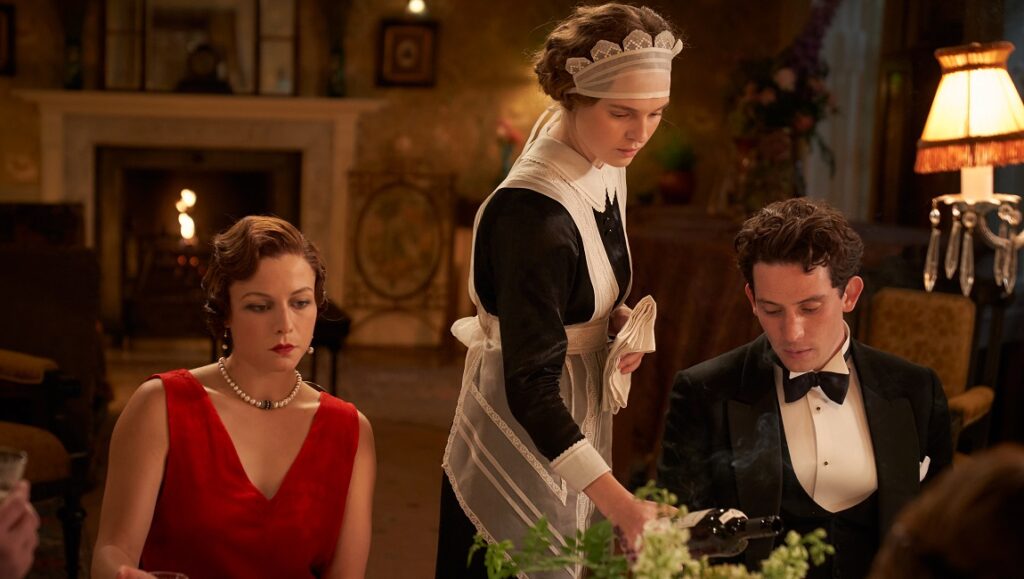Mothering Sunday fills its frames with striking images and gorgeously appointed spaces to the point of mind-numbing banality.
There’s a certain kind of film, one that even if seemingly flawless on a technical level, fails to form a cohesive aesthetic for any number of reasons; one that, rather than evincing any wrong decisions, is instead the victim of a series of inconspicuously mediocre ones. French director Eva Husson’s first English-language film, Mothering Sunday is a fairly apt example of such a work. Adapted from the admired same-name novella by Graham Swift, the film details the story of three prosperous British families — the Nivens, the Sheringhams, and the Hobdays — through the curious eyes of Jane Fairchild (Odessa Young), a housekeeper at the Niven’s familial manor and who is involved in an amorous, ill-fated affair with the hedonistic, aristocratic playboy Paul Sheringham (Josh O’Connor) against the mores and norms of the era. Mainly set in 1924, though its structure leads to an uneven mix of time streams, it becomes quickly clear that Husson is here aiming for an atmospheric adaptation, allowing her loose, flowing narrative to thread in themes of class, gender, and even race, but littered with emotional scars and profound, unspoken heartbreaks which deliberately distance the film from the more popular and cliché high society melodramas, like those adapted from Jane Austen novels, for instance.
Fair enough, but in angling for a more distinctive, atmospheric post-WWI costume (melo)drama, Mothering Sunday tilts toward simply a different tacky fashion. While decided in its tone and artistic character, the film lacks for much originality or vigor, and it’s easy to cite any number of more ambitious (and better-known) films that have, to varying degrees, employed familiar aesthetic expressions and questioned quite similar concepts within quite similar contexts. Everything from the sturdy Merchant-Ivory films to Terence Davies’ work to more recent examples such as Paul Thomas Anderson’s Phantom Thread and Céline Sciamma’s Portrait of a Lady, or even Autumn de Wilde’s Emma, makes Eva Husson’s third feature film feel distinctly superficial, like little more than a copycat effort. Put more precisely, it seems like what the director does with Mothering Sunday is to take the most discernible qualities of a number of like-minded films and render them in expressly middlebrow style.
That said, there’s still a very obvious tenderness and gentleness to Husson’s smooth, radiant visuals, thanks in no small part to the work of DP Jamie Ramsay, but in the absence of any genuine strategy through which to delineate the interiorities of the characters and their complicated emotions and relationships, Mothering Sunday repeatedly falls prey to imbuing the film with gauche flourishes to the point of banality: there’s an overreliance on extreme close-ups and soft focus, a litany of meaningless slo-mo moments, endless shimmering beams of sunlight that permeate nearly every shot, the overt mixed usage of ambient and classical music, and, most glaringly, an obsession with Jane and Paul posing or walking around nude, merely for the camera lens rather than any expression of character. Of course, none of these stylistic tics are wrong on their face; on the contrary, they’re mostly executed with a modicum of taste and delicacy, the ravishing images pleasing to the eye in isolation. The problem is that Husson offers no restraint, each scene a calculation in vanity and appointment, the beauty appearing and reappearing, one frame after another, to the point that it all becomes mind-numbing and unchallenging. No cautious attention is asked of the viewer, only mindless indulgence — which seems to be Husson’s entire playbook — and the result often feels more like (very) professionally-made cosmetic commercial.
It’s this emphasis on superficial gloss that prevents the film from truly taking viewers into repressed feelings hiding in each frame — the profound senses of loss, love, and lust of a group of only partially-fleshed out characters — which also has the effect of delivering too little material to build demanding, nuanced roles from, leaving the cast of Glenda Jackson, Olivia Colman, and Colin Firth with little to do but populate pretty tableaux. And thanks to the monotonous moodiness and imbalanced pacing — particularly felt whenever the film opts for its non-linear narrative flourishes via flash-forwards and flashbacks — the would-be ethereal atmosphere of Husson’s Mothering Sunday remains mostly ineffective and insufficient: a melodrama absent feeling, an erotica without passion, a melancholia empty of much shading or intensity. A modern-day example of what was once dubbed “Cinéma du look” among French film critics during the ‘80s and ’90s, Husson’s film is an overly familiar and lackluster looker, too pleased with its own mediocrity. Ironically, for a film ostensibly about notions of haunted memories and the persistence of the past in the present, the gorgeous but trifling Mothering Sunday is unlikely to stick in viewers’ minds for long.


Comments are closed.